- Home
- Ninie Hammon
Trapped (Nowhere, USA Book 3) Page 14
Trapped (Nowhere, USA Book 3) Read online
Page 14
A band of about ten Hutus have found the terrified civilians, and would already have swarmed into the house and butchered every occupant, were it not for the presence of the squad of American soldiers who happened to pass by. They are unwilling to display their savagery before onlookers, so they are waiting for the Americans to leave before they slaughter the families huddled in the house.
The leader of the Hutu tribals is a tall gaunt man with a fat scar slicing across his left cheek and down his neck to his bare chest. His teeth have been blackened by chewing the narcotic weed khat, a shrub with leaves that contain a compound with effects similar to those of amphetamines.
The drug is rampant in Somalia, its addicts termed “skinnies’ by American soldiers because the drug hypes them up and dulls their appetites, making them walking skeletons. Scar-Face and the rest of his crew look like chipmunks with wads of khat stuck in their cheeks. Saliva slowly breaks down the compound and the drug enters the bloodstream, while users spit on the ground a green confetti of discarded leaves.
Their eyes are wild. They carry bloody machetes and butcher knives. One has only a sharpened stick stained brown with blood.
“You go,” Scar Face calls out. “Not your business.”
At that moment a woman bursts out the door of the house and runs toward the American soldiers. She carries a baby and is dragging a little boy of about eight by the hand.
“Take my children,” she cries at the soldiers. “Save them.”
Scar Face gets to her before she reaches the road, raises his machete and buries it in her back and she staggers forward several steps with it stuck there. Sharp-stick man is one step behind and he spears the infant that falls out of her arms when she tumbles to the ground.
But the little boy is quick, and he darts away from the murderers and makes it to the contingent of soldiers on the road, throws himself at them, grabbing hold of Malachi’s leg and hiding behind it.
Scar Face advances, machete raised.
Malachi isn’t even aware of raising his weapon, sighting in on the chest of the advancing Hutu, doesn’t even will himself to speak, as he calls out, “Touch this child and I will blow a hole in your chest big enough to drive a Humvee through.”
Malachi’s sergeant wheels on him.
“I said, get in the truck, Tackett. Leave the boy and load up.”
Malachi doesn’t move.
“That is a direct order, soldier. Get in the truck.”
The Hutu takes a step toward him and Malachi fires, his bullet catching the man in the chest and knocking him backward. He throws the machete at the child as he falls and it catches Malachi in the leg, slicing him open from knee to ankle. Before the man hits the dirt, Malachi has swung the rifle toward the others in the man’s crew, daring them to approach. “One more step and I’ll—”
The world goes black.
When Malachi again opens his eyes, he is lying on his back in the transport truck, bouncing along the road toward the airport. His best friend, Charlie Blinkhorn, is leaning over him.
“I’m sorry, man, but I had to do it. You woulda shot all of them.”
The man sitting next to him nods toward the front of the truck where the sergeant is sitting beside the driver. “But just one … Sarge is gonna say the guy attacked you and you had no choice but to shoot him.”
Malachi’s mind is spinning and he is so dizzy he can barely manage to keep his head up. He hears what the man is saying, but the words aren’t yet connecting to reality in his mind.
The boy. Where is the boy?
He tries to rise.
“I got to get back to the boy,” he says, as hands restrain him and push him back down onto the floor. Malachi fights with all his strength, which is no strength at all. His mind is caught in a loop. He has to get to the boy, find him, save him.
“Let me go. The boy—”
“Is dead, Malachi,” Blinkhorn tells him. He pauses, sees Malachi still isn’t tracking, and leans close to whisper into his ear. “The one with the sharp stick, he gave Sarge the little boy’s head and told him to give it to you.”
Then Malachi falls into another blackness, a different blackness.
Malachi turned from Roscoe Tungate and started toward the woods.
“Harry ain’t in the woods,” Roscoe tells him. “He’s here, under here. I know he is. Help me get him out.”
“The boy,” he said. “I have to find the boy.”
Then Malachi broke into a dead run toward the trees.
Chapter Twenty-Eight
The big crowd of people had dispersed after the meeting, quietly going out to their vehicles and driving away. Charlie had no idea if they had bought what she was selling or not. Before the crowd left, Viola did her best to discredit Charlie.
“Nowhere people ain’t like the rest of mountain folk. All mountain people got their own music, their own licker, their own dances, their own way of courting and their own way of thinking. But nowhere people are different from them folks. We’re the people the rest of the world forgot. We don’t matter — shoot, nobody even knows how many of us there are because we ain’t even worth sending somebody out to count noses. The world’s done passed us by. This Jabberwock thing, all it done was build a fence around us. It didn’t change who we are. We’re nowhere people and we look after our own.”
She had glared at Charlie then, a look that both threatened and challenged. A look that said, “Go ahead, underestimate me — that’ll be fun.”
“We don’t need some know-it-all who’s spent more time away from Nowhere County than she ever spent in it, to fill our heads with a bunch of hooey about people vanishing. Going poof, like a puff of smoke. Like they’s something out there trying to ‘eat us up.’ Them’s scared stories for around the campfire but they ain’t real life. There’s plenty of real stuff to be scared of. Are you gonna have enough to eat? Will there be heat this winter? Water? What’re we gonna do when we run out of gasoline? Ammunition? Them’s real scary things, not made-up ones. You can leave here assured that I got this, I got answers to all the real questions. I ain’t been chasing my own tail around looking for the boogeyman under the bed these past two weeks. I been figuring out how we all gonna survive.”
One final glare.
“And we are gonna make it, without no help from you, missy.”
Viola was just as hostile to the people who wanted her to return their weapons, the ones her sons had collected after she’d disarmed the crowd. “You got guns to hunt with. You don’t need these here and you ain’t getting them back until I decide to give them back.”
As the crowd thinned, it became clear not everybody was leaving.
Duncan Norman and his wife, Miriam, stayed. The reverend had ash-gray hair cropped “high and tight” above a lean, ascetic face with a hawk nose and heavy eyebrows better suited to intimidating scowls than to smiles. He was tall and scarecrow thin, his wife was birdlike, too, and fragile. That the two of them had produced an offspring like the enormous teenager who’d sat blind and deaf in the Dollar General Store parking lot on J-Day gave credence to Charlie’s long-held suspicion that the incidence of gypsies switching babies might be more prevalent than most people believed.
Lester Peetree, the hardware store owner who’d taken the kiln door off its hinges, stayed, too. So did two women Charlie didn’t know, along with Hank Bayless, whose pickup had been used to haul away Willie Cochran, the Jabberwock’s first fatality.
“We’ll have to take Liam, his body, to …” Sam was trying to get her emotions in check enough to think clearly, but it was clear to Charlie that Sam’s circuits had fried.
“To Bascum’s,” said Rev. Norman, who had knelt beside Sam. His voice was surprisingly kind and gentle, and Charlie readjusted her assessment of “severe.” He looked up at Lester Peetree, who took the handoff.
“We’ll see to it,” Lester said. He and Hank Bayless lifted Liam up off the floor and carried him out of the building, dripping blood off the back of his shirt, and put him
in the bed of Hank’s pickup truck. It was only a couple of blocks to the funeral home and Mrs. Throckmorton kept Merrie occupied chasing fireflies in the dusk so Charlie could go with Sam and the others. They unloaded Liam’s body, carried it into the basement, placed it on the tray in one of the mortuary’s “body drawers” and slid the drawer into the wall.
It wasn’t the only body in a drawer. Martha Whittiker rested there, too.
The others left. Sam and Charlie stayed behind, reluctant to go.
“What are we going to do?” Sam asked.
Charlie noticed more and more often that Sam was thinking the same thing she was, that the bond of two little girls who played baby dolls in the shade of the old elementary school building had reconnected the women they’d grown to be.
“About a service and a funeral?” Charlie said. She put her arm companionably around Sam’s waist. “We’ll figure that part out.”
“Okay.” Sam let out a breath that was somewhere between a sob and a sigh. “You’re right. The rest will have to wait until later.”
“What rest?”
“What we do about Viola Tackett.”
“She’s clearly on the move to take over the whole county, but I don’t know what you and I can—”
“Not that,” Sam said. “You weren’t where you could see. I was.”
When Sam turned toward Charlie, Sam’s face was as hard as granite.
“The bullet hole was in Liam’s back. His back!”
Charlie’s mind stumbled, trying to figure out what that meant, the implications—
“He’d jumped down off the stage and weighed into the crowd and then — bang! I was looking right at him … could see past him.”
When Charlie got it, her eyes caught Sam’s and hung.
“And the person behind Liam … was on the stage.”
Sam nodded. Her husky voice seemed almost to growl. “Viola Tackett.”
Chapter Twenty-Nine
Run.
Hide.
Which?
Hayley was too panicked to make a rational decision, but the decision was made for her when terror propelled her forward, thrashing through the woods and the undergrowth. Between gasping breaths that exploded out of her chest, she heard someone running through the woods with the same abandon as she had. Howie was behind her, chasing her.
It was impossible to run fast in the clunking army boots and they made her clumsy so that she tripped over a tree root and sprawled on her belly in the leaves and dirt. Scrambling to her feet, she hunkered down behind the tree trunk, trying to get her breath.
Howie was a wild man. He wasn’t just chasing her. He was yelling, screaming, howling in pain. Garbled words rode his screams. Obscenities. Threats. Anger … rage!
There was blind hate in the voice screaming out of the throat of the man whose child she carried “beneath her heart.” If he caught up with her, he would kill her.
Even without the bulk of the army boots, Hayley couldn’t run fast. She was a hundred— okay, a hundred-fifty pounds overweight and she couldn’t move fast no matter how hard she tried, not hauling all that weight around.
But Howie had a bad knee. He couldn’t run fast on it or it would fall out from under him.
Could she outrun him if he saw her?
She didn’t know—
And then she found out.
He had changed direction, had spotted her behind the tree and was coming right at her,
“Arrgggg, you whore. I’ll kill you.”
Hayley bolted, trailing the raging man and his screams behind her like the tail on a kite.
Now that he’d spotted her, she couldn’t get far enough ahead of him, couldn’t run fast enough to get out of his sight and hide. She would have to escape him by outrunning him. And Hayley Norman didn’t believe that was possible.
Her heart was banging so hard her whole face pulsed with each beat. She was slathered in sweat, her hair pasted to her forehead, her breathing rasping, gasping.
There was a stitch in her side that hurt so bad she could barely stand up, let alone continue to run. But she couldn’t stop. No matter how bad it hurt, she couldn’t stop. The trees in front of her seemed to be thinning out, and that would make it easier going. But it would be easier for him to see her, too. In the fading light, the shadows of trees had offered some concealment, but in the open—
Then she realized why the trees were thinning. Up ahead of her was a logging road. The woods were full of them. It would meander down to Crockett Pike, and the turnoff to the parking space in the woods. If she took the road it would literally become a footrace. Could she get down it, into her car and away before Howie caught up with her?
Or should she stay in the woods, veer off to the right or left, make it harder for him to keep up with her on that bum knee? If she could elude him for a while longer, it would be dark. If she could just stay out of his grasp that long, he would never find her in the woods—
A truck.
There was a pickup truck on the road. Hayley couldn’t run anymore. The best she could do was stagger, her breathing a gasping wheeze, bent over the stitch in her side, but the truck was driving slowly, which was the only way you could drive on a logging road full of gigantic potholes.
Who could possibly be out here in the woods on a logging road at twilight?
She didn’t care who it was, she had to catch them. Had to get in front of them before they passed by, flag them down, plead with them for help.
Now it was a race. Not only away from Howie behind her but toward the pickup truck ahead. If it made the next bend before she got out of the trees and onto the road where she could be seen, the driver would pass unknowingly by and she would have lost all chance to flag him down. She didn’t have enough air to cry out for help. She just had to get to the road before the truck passed.
Had to.
Thirty feet now.
Twenty.
Fifteen.
She was going to make it!
Then she felt a hand on her shoulder. She frantically shook off the hand and lurched forward. But then Howie grabbed a handful of her hair, yanked her backwards off her feet. She flew through the air and landed in a bone-jarring heap on the forest floor.
She looked up then into his face and it was a ruined horror. She screamed, shrieked, cried out in terror at the top of her lungs. Except she didn’t. She couldn’t get in enough air to breathe, let alone scream. The sound she made, terror and rage, rang out only in her head.
Howie’s mouth was nothing but a bloody gash in his face, pouring gore down his chin. His nose was broken and bleeding and four deep cuts slashed down his left cheek — more than mere scratches. Where she’d clawed him with her fingernails looked like he’d been mauled by a bear.
He stood over her, panting, spewing out a spray of blood at her as he gasped for air, trying to catch his breath. She rolled over, tried to stand, but he tackled her, literally leapt on her back and used his weight to crush her down in the dirt beneath him.
He was coughing, gasping in her ear, almost-words, obscenities, hatred. He moved enough to yank her over onto her back so that the gore of his face was dripping directly into hers. He clamped his hand over her mouth to keep her from screaming and she struggled in panic, couldn’t get in enough air through her nose. So she bit him as hard as she could, got the side of his thumb in her mouth and bit all the way to the bone. She could feel it with her teeth. He yanked backward in agony, would have screamed if he’d had enough breath. She heard the truck approaching and shoved at Howie with all her strength, wiggling and kicking out with her feet and hands.
Off balance, he toppled off her to the right and she scrambled to her feet and staggered the final fifteen feet to the edge of the trees and out into the road. The truck had just passed, leaving a wake of dust in the air, but the driver would see her standing there, swaying in the road when he looked in his rearview mirror.
When he looked back …
If he looked …
But he didn’t. The pickup truck turned the final bend at the top of the hill and disappeared.
She heard Howie behind her and she turned. He was making a sound that might have been laughter. He had a broken tree limb the size of a baseball bat in his hand. He swung it at her head. She tried to duck, but she wasn’t quick enough.
Then the world went black.
Chapter Thirty
As Stuart bounced along the road on his way to meet Shepherd Clayton, he understood that he was traveling through more than space. He was traveling from one culture to a totally different one that appeared similar on the outside but was distinct and separate in every way that mattered. Oh, Charlie had told him about it, about how remote the hollows were in the mountains where she had grown up. About the people who lived there who never saw strangers and wouldn’t welcome one if they did.
“The words on the calendar about Abby Clayton’s graveside service — you’re sure they were in Charlie’s handwriting?” Cotton asked as he piloted the car around the hairpin turns with an ease that unnerved Stuart.
“Her handwriting slants backward. I’ve teased her about it, told her that her sentences looked like all the words were facing a strong wind. Charlie wrote that note.”
“Which means …?”
“Yeah, Cotton, what does it mean? Clearly, Charlie was there, was in that house … sometime. She planned to go to Abby Clayton’s graveside service.”
“You think she knew Abby Clayton? There wouldn’t be any reason I could see that they’d have crossed paths. Abby was an 18-year-old high school dropout who lived … you’re about to see how far back in the hollow she lived. I bet the sun only shines here a couple of times a week.”
Stuart bleated out a frustrated bark of not-laughter.
“This doesn’t make any sense Cotton. None of it does.”
Cotton glanced at him with a sympathetic look, and Stuart decided not to make any more odd sounds because he didn’t want Cotton to look at him, to glance away from the road even for a second. It was darker here at seven-thirty than it was “out there on the flat,” and the mountain roads seemed even more treacherous. Stuart realized there was no true sunset or sunrise here and that struck him as sad somehow and he didn’t know why.

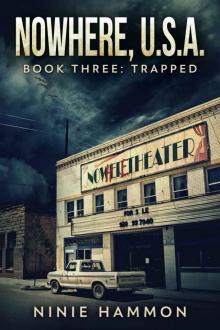 Trapped (Nowhere, USA Book 3)
Trapped (Nowhere, USA Book 3)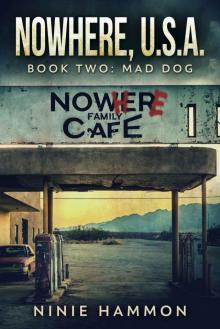 Mad Dog (Nowhere, USA Book 2)
Mad Dog (Nowhere, USA Book 2) Black Water
Black Water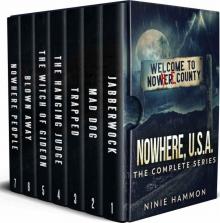 Nowhere USA: The Complete Series: A Psychological Thriller series (Nowhere, USA)
Nowhere USA: The Complete Series: A Psychological Thriller series (Nowhere, USA)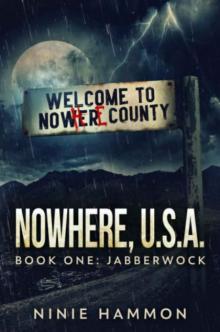 The Jabberwock
The Jabberwock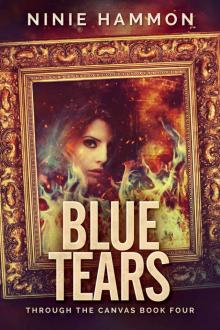 Blue Tears
Blue Tears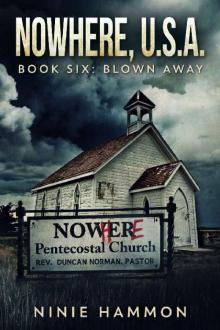 Blown Away (Nowhere, USA Book 6)
Blown Away (Nowhere, USA Book 6)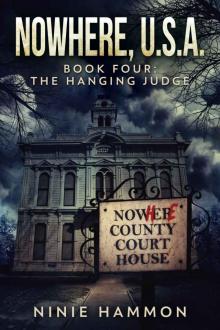 The Hanging Judge (Nowhere, USA Book 4)
The Hanging Judge (Nowhere, USA Book 4)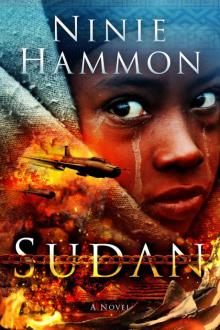 Sudan: A Novel
Sudan: A Novel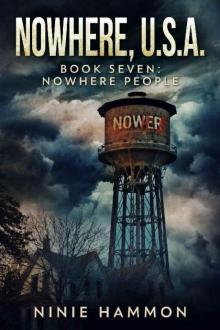 Nowhere People (Nowhere, USA Book 7)
Nowhere People (Nowhere, USA Book 7)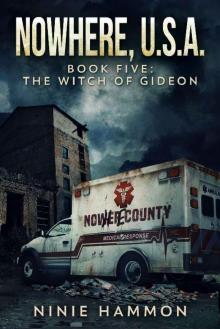 The Witch of Gideon (Nowhere, USA Book 5)
The Witch of Gideon (Nowhere, USA Book 5) Red Web
Red Web Gold Promise
Gold Promise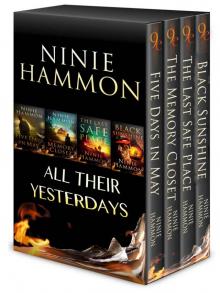 All Their Yesterdays
All Their Yesterdays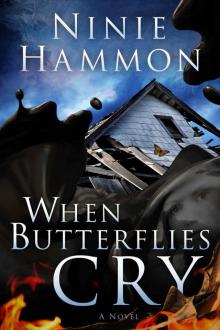 When Butterflies Cry: A Novel
When Butterflies Cry: A Novel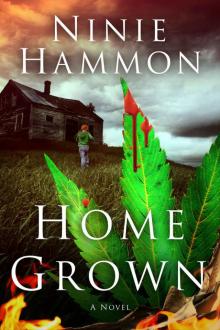 Home Grown: A Novel
Home Grown: A Novel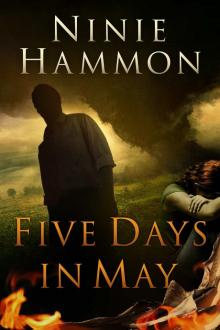 Five Days in May
Five Days in May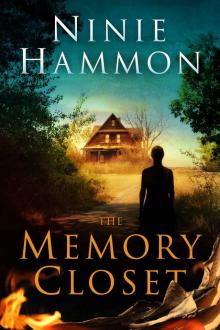 The Memory Closet
The Memory Closet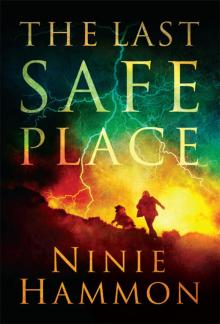 The Last Safe Place
The Last Safe Place The Knowing Box Set EXTENDED EDITION: Exclusive New Material
The Knowing Box Set EXTENDED EDITION: Exclusive New Material